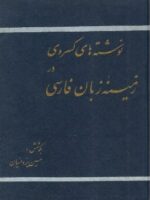تاریخ پانصدساله خوزستان
مجموعه ی حاضر تاریخ پانصد ساله خوزستان را به تصویر می کشد، شهری با آب و هوایی گرم و طاقت فرسا که جنگها، حوادث و شورش های فراوانی را دیده است، جایگاهی که در آن افراد بسیاری روی کار آمده اند، حکومت کرده اند و بنا بر رسم روزگار از پای افتاده و جای خویش را به دیگری سپرده اند. روایتی از شکل گیری مشعشعیان، کعبیان و پیشامدهای دیگری که پس از آن ها در سرزمین خوزستان به وقوع پیوست.
تاریخ پانصد ساله خوزستان دارای دو بخش اصلی «مشعشعیان» و «کعبیان» است. این کتاب تاریخ خوزستان را از قرن نهم هجری تا قرن حاضر در بر میگیرد. احمد کسروی خود در زمان شیخ خزعل در سال ۱۳۰۲ خورشیدی به خوزستان سفر کرد و بیش از یک سال در آنجا ماند. او که شاهد تحرکات شیخ خزعل بود به جستجو در تاریخ این منطقه میپردازد و پس از بازگشت به تهران به جمعآوری اسناد و مدارک میپردازد. او در کتاب خود عقاید و فرمانروایی مشعشعیان در بخش غربی خوزستان را شرح میدهد که آن زمان «عربستان» نامیده میشد و کتاب را با سرکوب شیخ خزعل در دوران «رییس الوزرا» (رضا شاه) به پایان می رساند؛ واقعهای که خود در جریان و شاهد آن بود. «تاریخ پانصد ساله خوزستان» نه تنها شرح تاریخ سیاسی و دست به دست شدن قدرت بین خاندانهای مختلف خوزستان است بلکه کسروی از خلال شرح جغرافیای منطقه و چگونگی شهرها و رودها و سدهای خوزستان، نقبی میزند به وقایع تاریخی و خاندانهایی که در این منطقه به روی کار آمدند.
A seminal history of Khuzestan, stretching from the fifteenth century to the first decades of the twentieth. It was among Ahmad Kasravi’s astoundingly inventive regional histories, which drew on rediscovered primary sources, modern geographical information and first-hand experience to describe specific Iranian regions in their full complexity. Most significantly, the work broke away from the national historiography of the period, which chiefly focused on pre-Islamic Iran.
As a historian, Kasravi (1890-1946) felt his main task was to “preserve and consolidate national unity, which he believed to be under threat from sectarian differences and the multiplicity of languages and dialects.” (Manafzadeh, Encyclopaedia Iranica). Illuminating the past of certain regions was part of that effort, as their official histories had often been distorted to reflect particular interests and prejudices. This was especially the case in Khuzestan —one of Iran’s most diverse provinces— where sectarian and ethnic tension had become commonplace.
Kasravi based his history on the roots of the long-established Arab population, splitting the book between two ruling tribes, the first part devoted to the Musha’sha’ and the second to their successors, the Banu Ka’b. The part on the Banu Ka’b is particularly remarkable, in its revival of manuscript sources (such as Tarikh-i Ka’b, by the tribal historian Sheikh Fat’h Allah Ka’bi) and detailed account of Sheikh Khaz’al’s reign as the ruler of Arabistan (Khuzestan). Kasravi was especially well-placed to comment on the latter, as he met Sheikh Khaz’al and was present for the termination of his rule by Reza Shah in 1925.
Alireza Manafzadeh stresses the importance of the work: “This book … gives for the first time the unexplored history of the region. It is through this type of study that Kasravi paved the way for scientific investigation of the various regions of the country. No subsequent history of Khuzestan can afford to ignore it.”
Uncommon. LibraryHub locates two copies in the UK, at Durham and Manchester. OCLC adds nine more, at the Royal Danish Library, National Library of Sweden, Bibliothek der Franckeschen Stiftungen (Halle), University of Göttingen, University of Marburg, Columbia, Library of Congress, Princeton and the National Library of Israel.
Reference: Alireza Manafzadeh, ‘Kasravi, Ahmad’ in Encyclopaedia Iranica, XVI/1, Fasc.1, 2012, pp.94-97.











